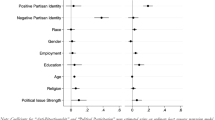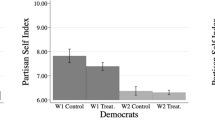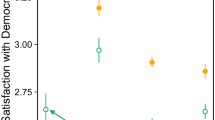Abstract
Polarization has increased in recent decades, including emotional distance between partisans. While positive partisan identity has been linked to the absorption of democratic norms and democratic satisfaction, this article addresses the impact of negative partisanship on citizens’ satisfaction with the functioning of their democracies. Employing two measures of negative partisanship – dislike for a party and unwillingness to ever vote for a party – the article finds that negative partisanship is linked to lower satisfaction with democracy, particularly negative partisanship for major parties. It also finds that respondents’ sentiments towards other parties moderate the experience of electoral outcomes; the win/loss satisfaction gap is greater for negative partisans. Defeat is more strongly tied to satisfaction for negative partisans of governing parties. Coalition membership, on the other hand, is more valuable to them. This relationship raises concerns that increasing rates of negative partisan identity reduces democratic commitment, undermining democratic stability.



Similar content being viewed by others
Notes
NPID can also influence apolitical behaviors. American partisans who have strong negative affect towards out-partisans are less likely to award scholarships to out-partisans and are less generous with out-partisans in dictator and trust games; while in-group favoritism plays a role in this pattern, “Outgroup animosity is more consequential” (Iyengar and Westwood 2015, p. 703). Strong negative sentiment towards out-partisans is also reflected in unwillingness to accept them as family members (Iyengar, Sood, and Lelkes 2012).
Empirical work does not focus on demonstrating the relationship between satisfaction and commitment. However, it can be shown using the 2nd Module of the CSES (CSES 2015a) that individuals who are more satisfied with the functioning of their democracy are more likely to believe that democracy is the best form of government, making them more committed democrats (Online Appendix 1).
Although the CSES has multiple modules, it is not panel data; the module provides point-in-time respondent information from post-election surveys. As such, it cannot be used to look for reinforcing relationships for (dis)satisfaction and negative partisanship cross-temporally. Such questions must be left to future research. It cannot be conclusively rejected that some previously dissatisfied democrats became subsequently negative partisans. For now, this research relies on associational models, and it considers it more likely that the system is evaluated based on its component parties and their interplay than that a voter’s negative evaluation of the political system is being visited on any particular party. Were dissatisfaction to flow into animosity, it seems more likely that it would be generalized; however, the data show that while many citizens would never vote for a particular party, they would not refuse to vote for many of the parties.
As the like/dislike scale was included in multiple waves, those measures were tested as well on the Integrated Module Dataset, which features a subset of questions that have appeared in more than two waves of the CSES. The results are substantively similar to those from the 3rd module (Online Appendix 2).
The CSES codebook identifies the largest parties based on the vote share in the lowest level of the recorded election, ideally the first round of the lower house election.
The 3rd module data for the US assigns a value of 001 for respondents over 90; this is adjusted to 90.
References
Abramowitz, A. I., & Webster, S. (2016). The rise of negative partisanship and the nationalization of US elections in the 21st century. Electoral Studies, 41, 12–22.
Abramowitz, A. I., & Webster, S. W. (2018). Negative partisanship: Why Americans dislike parties but behave like rabid partisans. Political Psychology, 39, 119–135.
Aldrich, J. H., Bussing, A., Krishnamurthy, A., Madan, N., Ice, K. M., Renberg, K. M., & Ridge, H. M. (2020). Does a partisan public increase democratic stability? In Research Handbook on Political Partisanship: Edward Elgar Publishing.
Anderson, C. J. (2002). Good questions, dubious inferences, and bad solutions: Some further thoughts on satisfaction with democracy. Binghamton, NY: Binghamton University.
Anderson, C. J., & Guillory, C. A. (1997). Political institutions and satisfaction with democracy: A cross-national analysis of consensus and majoritarian systems. American Political Science Review, 91(1), 66–81.
Blais, A., & Gélineau, F. (2007). Winning, losing and satisfaction with democracy. Political Studies, 55(2), 425–441.
Bryan, M. L., & Jenkins, S. P. (2016). Multilevel modelling of country effects: A cautionary tale. European sociological review, 32(1), 3–22.
Campbell, R. (2015). Winners, losers and the Grand Coalition: Political satisfaction in the Federal Republic of Germany. International Political Science Review, 36(2), 168–184.
Canache, D., Mondak, J. J., & Seligson, M. A. (2001). Meaning and measurement in cross-national research on satisfaction with democracy. Public Opinion Quarterly, 65(4), 506–528.
Caruana, N. J., McGregor, R. M., & Stephenson, L. B. (2015). The power of the dark side: Negative partisanship and political behaviour in Canada. Canadian Journal of Political Science/Revue canadienne de science politique, 48(4), 771–789.
Comparative Study of Electoral Systems (www.cses.org). (2015a). CSES Module 2 Full Release. December 15, 2015 version. https://doi.org/10.7804/cses.module2.2015-12-15
Comparative Study of Electoral Systems (www.cses.org). (2015b). CSES Module 3 Full Release. December 15, 2015 version. https://doi.org/10.7804/cses.module3.2015-12-15
Curini, L., Jou, W., & Memoli, V. (2012). Satisfaction with democracy and the winner/loser debate: The role of policy preferences and past experience. British Journal of Political Science, 42(2), 241–261.
Dahlberg, S., & Linde, J. (2016). Losing happily? The mitigating effect of democracy and quality of government on the winner–loser gap in political support. International Journal of Public Administration, 39(9), 652–664.
Ezrow, L., & Xezonakis, G. (2011). Citizen satisfaction with democracy and parties’ policy offerings. Comparative Political Studies, 44(9), 1152–1178.
Garrett, R. K., Gvirsman, S. D., Johnson, B. K., Tsfati, Y., Neo, R., & Dal, A. (2014). Implications of pro-and counterattitudinal information exposure for affective polarization. Human Communication Research, 40(3), 309–332.
Greene, S. (2004). Social identity theory and party identification. Social Science Quarterly, 85(1), 136–153.
Hetherington, M. J., & Weiler, J. D. (2009). Authoritarianism and polarization in American politics. Cambridge: Cambridge University Press.
Howell, P., & Justwan, F. (2013). Nail-biters and no-contests: The effect of electoral margins on satisfaction with democracy in winners and losers. Electoral Studies, 32(2), 334–343.
Iyengar, S., Sood, G., & Lelkes, Y. (2012). Affect, not ideologya social identity perspective on polarization. Public opinion quarterly, 76(3), 405–431.
Iyengar, S., & Westwood, S. J. (2015). Fear and loathing across party lines: New evidence on group polarization. American Journal of Political Science, 59(3), 690–707.
Kim, M. (2009). Cross-national analyses of satisfaction with democracy and ideological congruence. Journal of Elections, Public Opinion and Parties, 19(1), 49–72.
Levitsky, S., & Ziblatt, D. (2018). How democracies die. New York: Broadway Books.
Linde, J., & Ekman, J. (2003). Satisfaction with democracy: A note on a frequently used indicator in comparative politics. European journal of political research, 42(3), 391–408.
Lühiste, K. (2014). Social protection and satisfaction with democracy: A multi-level analysis. Political Studies, 62(4), 784–803.
Mason, L. (2016). A cross-cutting calm: How social sorting drives affective polarization. Public Opinion Quarterly, 80(S1), 351–377.
Mayer, S. J. (2017). How negative partisanship affects voting behavior in Europe: Evidence from an analysis of 17 European multi-party systems with proportional voting. Research & Politics, 4(1), 2053168016686636.
Mayne, Q., & Hakhverdian, A. (2017). Ideological congruence and citizen satisfaction: evidence from 25 advanced democracies. Comparative Political Studies, 50(6), 822–849.
McCoy, J., Rahman, T., & Somer, M. (2018). Polarization and the global crisis of democracy: Common patterns, dynamics, and pernicious consequences for democratic polities. American Behavioral Scientist, 62(1), 16–42.
Medeiros, M., & Noël, A. (2014). The forgotten side of partisanship: Negative party identification in four Anglo-American democracies. Comparative Political Studies, 47(7), 1022–1046.
Michael McGregor, R., Caruana, N. J., & Stephenson, L. B. (2015). Negative partisanship in a multi-party system: The case of Canada. Journal of Elections, Public Opinion and Parties, 25(3), 300–316.
Richardson, B. M. (1991). European party loyalties revisited. The American Political Science Review, 85(3), 751–775.
Rose, R., & Mishler, W. (1998). Negative and positive party identification in post-communist countries. Electoral Studies, 17(2), 217–234.
Singh, S., Karakoç, E., & Blais, A. (2012). Differentiating winners: How elections affect satisfaction with democracy. Electoral Studies, 31(1), 201–211.
Singh, S. P., & Thornton, J. R. (2016). Strange bedfellows: Coalition makeup and perceptions of democratic performance among electoral winners. Electoral Studies, 42, 114–125.
Vlachová, K. (2001). Party identification in the Czech Republic: inter-party hostility and party preference. Communist and Post-Communist Studies, 34(4), 479–499.
Wagner, A. F., Schneider, F., & Halla, M. (2009). The quality of institutions and satisfaction with democracy in Western Europe—A panel analysis. European Journal of Political Economy, 25(1), 30–41.
Webster, S. W., & Abramowitz, A. I. (2017). The ideological foundations of affective polarization in the US electorate. American Politics Research, 45(4), 621–647.
Wells, J. M., & Krieckhaus, J. (2006). Does national context influence democratic satisfaction? A multi-level analysis. Political Research Quarterly, 59(4), 569–578.
Acknowledgements
I would like to thank Austin Bussing and Markus Wagner for their feedback on earlier versions this manuscript. I am also indebted to two anonymous reviewers for excellent advice. Earlier versions of this work were presented at the 2019 Midwest Political Science Association meeting and the 2019 American Political Science Association meeting.
Author information
Authors and Affiliations
Corresponding author
Additional information
Publisher's Note
Springer Nature remains neutral with regard to jurisdictional claims in published maps and institutional affiliations.
Data is available through the Comparative Study of Electoral Systems (https://cses.org/data-download/). Replication code is available at https://dataverse.harvard.edu/dataverse/hannahmridge.
Electronic supplementary material
Below is the link to the electronic supplementary material.
Rights and permissions
About this article
Cite this article
Ridge, H.M. Enemy Mine: Negative Partisanship and Satisfaction with Democracy. Polit Behav 44, 1271–1295 (2022). https://doi.org/10.1007/s11109-020-09658-7
Accepted:
Published:
Issue Date:
DOI: https://doi.org/10.1007/s11109-020-09658-7




